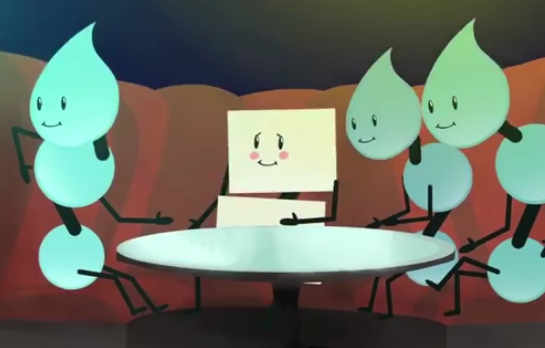Why does salt dissolve in water but oil doesn't?
為什么鹽可溶于水而油卻不行呢?
Well, in a word,chemistry. But that's not very satisfied, isn't it?
總的來說,是化學作用。但這并不令人滿意,對吧?
Well, the reason salt dissolves and oil does not comes down to the two big reasons why anything happens at all: energetics and entropy.
其實,鹽可溶于水而油不能的原因可歸結為一切現象發生的兩個根本原因:力能學和熵。
Energetics deals primarily with the attractive forces between things.
力能學主要討論物體之間的引力。
When we look at oil or salt in water, we focus on the forces between particles on a very, very, very small scale, the molecular level.
我們觀察水中的鹽或油時,會在一個非常微小的尺度即分子層級內關注粒子之間的作用力。

To give you a sense of this scale, in one glass of water, there are more molecules than known stars in the universe.
這個尺度究竟有多微小呢?在一杯水里,分子的數量比宇宙中已知的星星數量還要大。
Now, all of these molecules are in constant motion, moving, vibrating, and rotating.
現在,所有這些分子都在做勻速運動,移動、振動并且旋轉。
What prevents almost all of those molecules from just flying out of the glass are the attractive interactions between molecules.
阻止幾乎所有分子從杯子里飛出去的是分子之間相互吸引的作用力。
The strength of the interactions between water, itself, and other substances is what we mean when we say energetics.
水之間以及它與其他物質之間相互作用的力就是我們所說的力能學。
You can think of the water molecules engaging in a constant dance, sort of like a square dance where they constantly and randomly exchange partners.
你可以想象水分子始終如一地舞蹈著,它有點兒像那種經常且隨機更換舞伴的方塊舞。
Put simply, the ability for substances to interact with water, balanced with how they disrupt how water interacts with itself, plays an important role in explaining why certain things mix well into water and others don't.
簡言之,物質與水相互作用的能力,那種平衡水與自身的相互作用能力,在解釋有些物質可溶于水而另一些卻不能時扮演著重要角色。
Entropy basically describes the way things and energy can be arranged based on random motion.
熵基本描述了無規則運動基礎上物質與能量的組合方式。
For example, think of the air in a room.
例如,想象一個房間里的空氣。
Imagine all the different possible arrangements in space for the trillions of particles that make up the air.
想象一個空間里數萬億個空氣分子所有可能的組合方式。
Some of those arrangements might have all the oxygen molecules over here and all the nitrogen molecules over there, separated.
其中一些組合方式可能會將所有的氧分子置放在一邊,而將所有氮分子放在那一邊,使二者分離開來。
But far more of the possible arrangements have those molecules mixed up with one another.
然而,更多可能的方式是使這些分子彼此混合起來。
So, entropy favors mixing.
因此,熵傾向于討論“混合”。
Energetics deals with attractive forces.
力能學則討論引力。
And so, if attractive forces are present, the probability of some arrangements can be enhanced, the ones where things are attracted to each other.
故而,如果引力存在,一部分組合方式的可能性會被提高,也就是那些物體彼此吸引的方式。
So, it is always the balance of these two things that determines what happens.
所以,決定發生現象的通常是這二者的平衡。
On the molecular level, water is comprised of water molecules, made up of two hydrogen atoms and an oxygen atom.
在分子層級上,水是由水分子組成的,水分子由兩個氫原子和一個氧原子構成。


